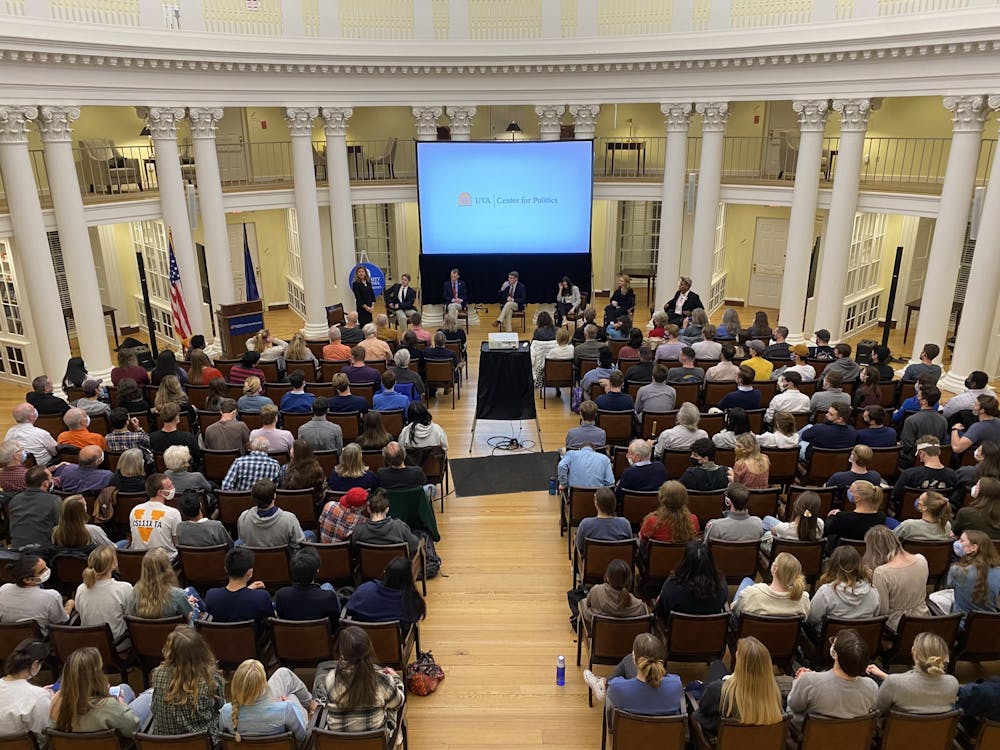The Center for Politics premiered its 30-minute documentary “Common Grounds” Thursday evening in the Rotunda Dome Room. The film is a culmination of nine months of work by five Center for Politics interns and brings together student leaders from a wide spectrum of political ideologies to discuss their beliefs and work towards understanding one another.
The premiere had both a virtual and in-person option and attendees were required to RSVP. After the showing, in-person attendees enjoyed complimentary hot cider and donuts. About 60 individuals attended the event.
The film began with a video introduction from Larry Sabato, director of the Center for Politics, who praised the production team for taking the initiative to carry out such a project.
The documentary follows a series of interviews of students from a wide range of political beliefs, from far liberal to staunchly conservative, who were brought together to discuss political questions. The students were selected to represent a diversity of political opinion with the goal of stimulating productive discussion without necessarily forcing any party to compromise on their political beliefs or agree with one another.
The documentary was created to demonstrate the highly tense political environment in which the Charlottesville and University communities are currently entrenched following the wave of political changes in recent years. The film contextualizes the intense political polarization after the election of former president Donald Trump in 2016, the Capitol insurrection in January and the “Unite the Right” rally in 2017.
“I made the decision to run for president after Charlottesville,” President Joe Biden said in an audio sample featured in the documentary. “Close your eyes and remember what you saw.”
Many of the students acknowledged the importance of political discourse in regard to events like the “Unite the Right” rally, where unacknowledged hatred and ignorance was permitted to grow into a violent demonstration. A trial filed against the organizers of the rally is currently underway.
The film’s format jumps between private interviews with the individual participants to group discussions as they discuss the extent of freedom of speech, the appropriate pathways to create change and the meaning of political civility.
The students also explain their connection to politics and the effect of having political ideologies attached to their identity, which some noted causes them to be treated differently by their peers. Students also addressed the concept of “cancel culture” and the idea of “student self-censorship” on Grounds, referring to the sentiment that some students feel uncomfortable expressing their political beliefs for fear of social shaming.
The film also addressed the University’s attachment to founder and former President Thomas Jefferson, quoting University President Jim Ryan who said he would not allow the University to walk away from its connection to the nation’s third president. The University’s connection to Jefferson has become controversial, with some arguing his staunch support of enslavement deem him an unfit figure for the University to endorse, while others have come to Jefferson’s defense.
The film ended with the various students who took part in the collective discussion collectively painting Beta Bridge, writing the message, “THERE IS COMMON GROUND ON OUR GROUNDS #HASHITOUT.”
Following the screening, the group of filmmakers held a panel to discuss the film and its implications on political discourse in a free democracy. The filmmakers — who hold quite varied political beliefs — discussed the challenges of creating such a project without a unitary political agenda behind it.
Molly Hayes, “Common Grounds” filmmaker and third-year Batten student, discussed some of the difficulties of having such a divided production team.
“Our group who made the documentary itself was a project in working across the political divide,” Hayes said. “Making a project about politics with people you very much disagree with is not easy. But ultimately that constant tension … allowed us to make a film as reflective of the interviews we were seeing as possible.”
Much like the themes the film portrays, the “Common Grounds” filmmaking team came together despite their political differences to highlight what they believe is an underlying commonality among people. Raed Gilliam, another filmmaker and fourth-year College student, explained why the group began this project.
“We are part of the same university … we’re all going through the same struggle,” Gilliam said. “This is something that takes us out of the lull of COVID, it takes us out of that lull of the very tense political discourse.”
The panel discussion then moved onto the topic of online political discourse, and the culture of rage and hostility that has arisen out of it. Sean Piwowar, filmmaker and fourth-year College student, explained what he believes is the best way to address political discord and the rampant vitriol within political discourse on social media.
“It comes down to sitting in a room with people and talking to them,” Piwowar said. “It wasn’t a debate, no one was hoping to win, and that’s what changed it.”
Closing out the discussion, panel members reflected on what they’ve discovered in the nine months they made this documentary. Providing her biggest lesson, Miranda Hirts, filmmaker and third-year College student, explained the importance of branching out.
“It’s very important to interact with people,” Hirts said. “It’s really important to break out of your circle and hear other viewpoints.”







